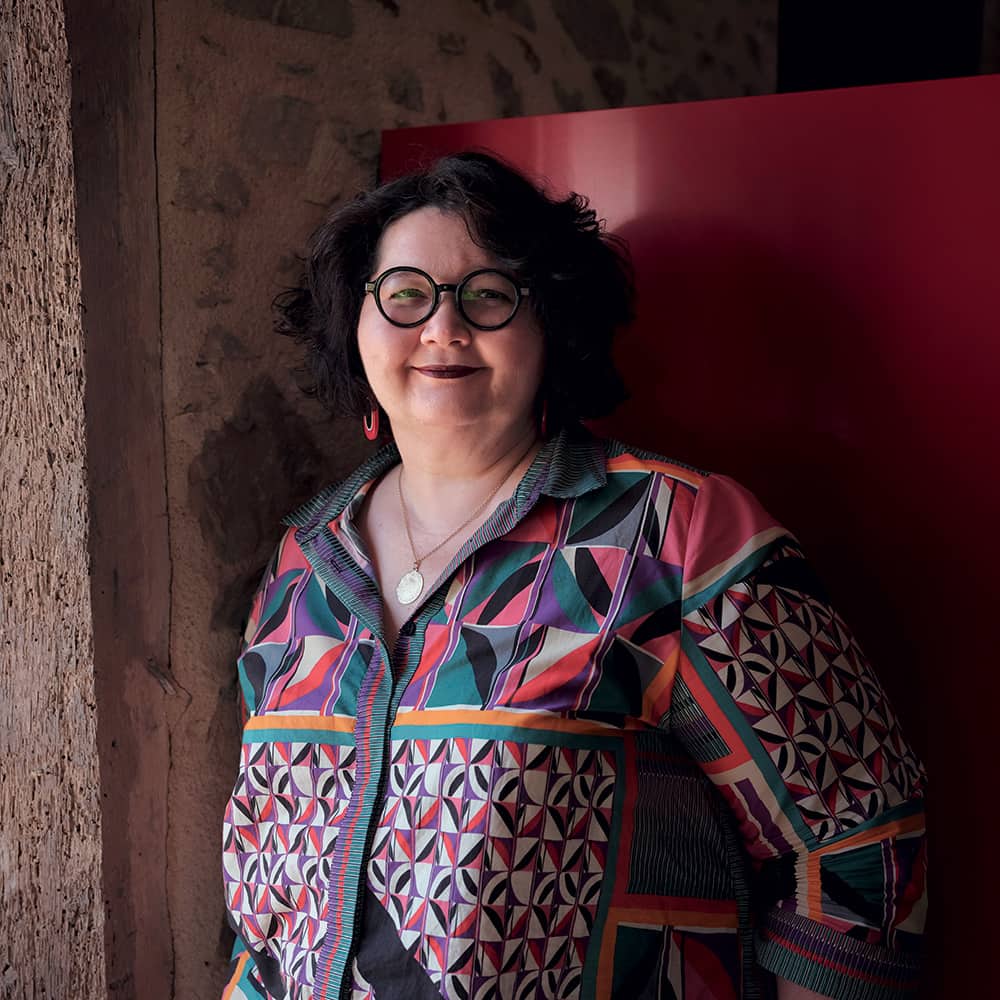Hélène Bourbouloux (H.95): Bankruptcy isn’t death!

The judicial administrator Hélène Bourbouloux, known as the “Bankruptcy Madonna”, has won a lot of battles. She has managed over 2,000 accounts and saved thousands of jobs. Today, she is preparing to confront an unprecedented economic whirlwind.

1995: Graduated from HEC
1998: Launched her own business with a partner
2007: Co-founded FHB, which provides expert services by eight judicial administrators at 14 locations
2013: Began the first Rapid Financial Safeguard Procedure for the Soflog group 2014: Won the HEC Women “Trajectories” prize
2020: Managed the accounts of Solocal, Novares, Presstalis, Rallye (Casino shareholder) and others.
Her voice is soft, but her tone is serious. While the rest of us may have trouble comprehending the unfolding crisis, Helene Bourbouloux knows that the countdown has already begun. “I can take the time to answer your questions because I only have four more meetings today,” she says. Keep in mind that it’s Sunday. We are in the seventh week of the lockdown in France. This lively woman, always with something to say, is one of France’s 150 judicial administrators, mandated by courts to assist companies in difficulty. Such companies, after their situations have been analyzed, seek the best possible solutions (safeguarding, going into receivership, restructuring, closing down…), submit any takeover bids to the courts, and then try to save as many jobs as possible. “I sensed that a crisis was coming even before the lockdown. You could feel a kind of feverishness in certain companies, especially ones affected by covid 19’s impact in Asia,” she explains, at her home in Lubersac, Corrèze. “Business deals in the final stages of negotiations with lenders were suddenly called off… Heads of companies I had worked with in the past, whose businesses were doing well again, called to tell me they were worried. It was like a rumbling in the background.”
It didn’t help that she, too, was infected by the virus: a fever for two weeks, along with intense body aches. “Adrenalin was what kept me going. Our offices had to be made secure, we had to set up videoconferencing with lenders concerning current accounts, help companies save their employee organizations… Every day felt as full as a whole week.” During the current healthcare crisis, she is called on constantly: in her profession, she is the best-known media spokesperson and one of the most highly respected leaders. “Nothing scares her,” one of her peers tells us. In 2020, she is managing the tricky account of Presstalis, the message service that handles distribution of France’s daily newspapers and several magazines and is currently undergoing bankruptcy proceedings. She is also managing the account of Novares, the first major covid 19 victim in the auto industry. After a two-month shutdown, the auto-components enterprise was placed into receivership, with 10,000 salaried workers hoping for a buyer.
The “liquidator” stereotype
In less than 20 years, she has made a name for herself in a very male-dominated profession that has not always had a good reputation: traditionally, judicial administrators have been seen, at best, as end-of-life caregivers, or, at worst, as hungry scavengers feeding on a wounded company. The image of the cartoon undertaker in the Lucky Luke graphic novels is always lurking in the background. “At HEC, the other students in my year often challenged me about my choice. They couldn’t understand why I would want to get involved in this kind of activity. They also complained because I brought down the average of starting salaries of graduates in our year,” she laughs. “In fact, while I was going to HEC, I also studied law at the university in Sceaux. That inspired me to wear two hats: economic and legal.” She was certainly influenced by her father, who was fascinated by the law and headed an insurance company in Brive-la-Gaillard for many years. He introduced her to the joys (and risks) of running a company. “I learned about the profession at an HEC Entrepreneurs seminar on receivership, and then I was able to find internships. From the very beginning of my career, I benefitted from excellent word-of-mouth contacts, and that was clearly because of my HEC diploma. It reassured heads of companies, who believed I was capable of handling their accounts. I was basically from their world. I understood them.”
Saving companies
France has 150 judicial administrators. These adjuncts to the courts are tasked with overseeing – or fully managing – companies’ recovery processes. Their goal is to avoid bankruptcy and closure, making sure contracts are honored. During this time, a company’s debt payments are postponed. The process ends in either receivership, divestiture, or a court-ordered liquidation.
Doomed to be happy
At Sceaux and then at the Sorbonne, she completed her education in economics by diving into the labyrinth of laws on securities, layoffs and insolvency procedures. Then she joined one of the most prestigious firms in France. These first steps should have propelled her career to the top, but instead she was dragged down. The firm’s top executives were arrested for embezzling, and the company was placed into temporary receivership. This scandal tainted the whole profession. Once again, she was advised to choose another career path, but she wanted to help usher in a new era free of the dubious practices of the past. “At 25 years old, I learned a lot from this strange situation. I was managing exciting accounts while my boss was in prison. I learned how to get things done on my own for six months, before the firm was finally closed down.” She then met Laurent Bachelier, a more experienced administrator seven years older than she was. The ideal professional union. In April 1998, the two of them founded their own company in Nanterre. “Starting a company had always been my dream. Opening offices, hiring the first employees… I was just brimming with energy. I had found my purpose.” But, after six years, a new shock: her partner died suddenly of a heart attack. These two major and very different upheavals forged her character and helped her stay on her feet in the economic turmoil to come. She managed billions of euros in debts and worked to limit social fallout as she handled complex accounts like Petroplus, FagorBrandt, Vivarte, France Loisirs and EuropaCorp. “I was doomed to be happy, and I learned that no one can do everything alone.” She created a new professional family when she founded FHB with two colleagues. Today, the company employs more than 70 professionals.
An explosion of bankruptcies to come?

For a judicial administrator who lives her life full speed ahead, the healthcare crisis has revealed the weaknesses in a system plagued by excessive bureaucracy. “For the past month, while I’ve been overseeing around 80,000 jobs in my portfolio, we have only signed one guaranteed government loan, and that was for a company with 17 employees. We will complete three more within a week, but that’s not enough. The government announced a 300-billion-euro package, but only 50 billion euros have been allocated so far, even though companies need this funding now!”, explains this savior of companies. She is fed up with how slowly banks hand down decisions as well as the fact that companies have to demonstrate a clean bill of health and prove that their difficulties are directly related to the current exceptional situation. During this economic tsunami, as she calls it, the last thing companies need is a pervasive fear of bankruptcy. (“Bankruptcy is not death,” she often says.) In March, she and other judicial administrators, along with Bercy, launched a free number that heads of companies can call for information from receivership professionals about renegotiating loans and delaying tax and social-services payments.
In 2009, at the height of the financial crisis, around 60,000 companies declared bankruptcy in France. What can we expect in 2020? “A study by an insurance company at the beginning of the lockdown predicted a rise of over 15%, but I think that’s grossly underestimated. I think that we will have managed the crisis effectively if we can survive an increase over several years. Having 70,000 bankruptcies in two years is not at all the same as having 100,000 bankruptcies in 10 years. Companies need to downsize without disappearing.” In other words, to put it bluntly, they need to lose 20 employees to save 60 jobs. She is sure of one thing: unemployment will continue to rise for the next decade.
“Commercial courts were going to be closed during the lockdown, but we insisted that hearings should still be held.”
Taking the Zen approach
Every cloud has a silver lining…. This extreme phase that has left many companies hanging by a thread may lead to streamlined procedures. “Commercial courts have dealt with the situation remarkably well. Even though they were supposed to be closed during the lockdown, we insisted that they continued to hold important hearings and that we could make decisions about ad hoc mandates, conciliations, safeguards and receiverships, all through videoconferencing and teleconferencing.” Even though processes have been simplified, however, everything still takes time, emails and text messages never stop coming, and there are only so many hours in a day. “A judicial administrator has to find the right words and instruct people. These days, I feel more like the chief warrant officer in negotiations!”, she explains. Hidden away in Corrèze, this woman who never takes time off on weekends or goes on vacations says she misses her Pilates classes a little, but she compensates for that by taking short walks in her garden, complete with earbuds. Not to be carried away by New Age music, of course, but to lead intense conference calls. When we say we’re a bit worried about her health, she reassures us. “I’m forcing myself to take the time to finish a puzzle, something I certainly haven’t done since I was 13 years old.” And not just any puzzle. This one, with 1,000 pieces, is a reproduction of Gustav Klimt’s “Tree of Life” painting, a nearly monochromatic image filled with spirals and abstract symbols. We told you: nothing scares this woman.
Interview by Bertrand Morane
Published by La rédaction

